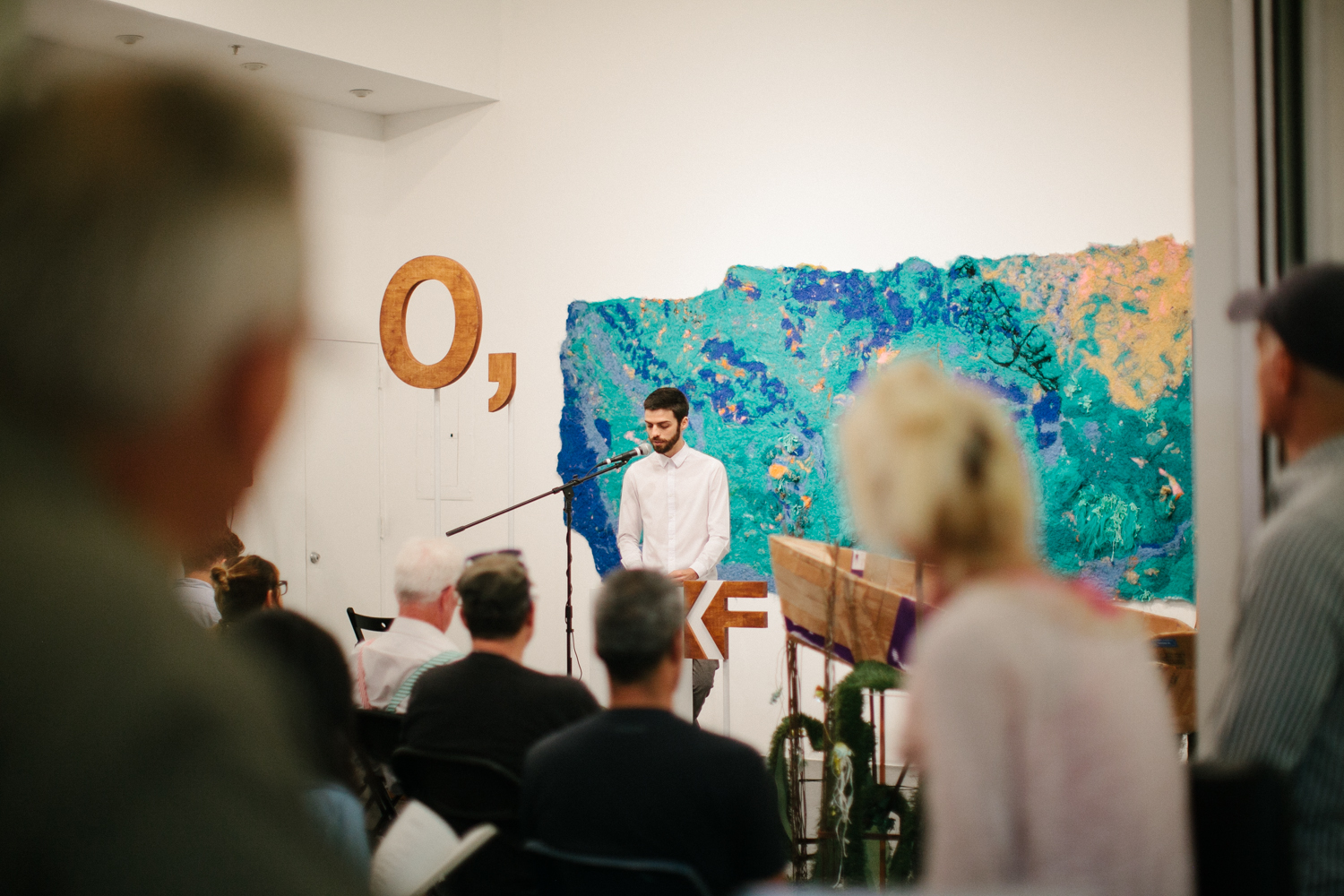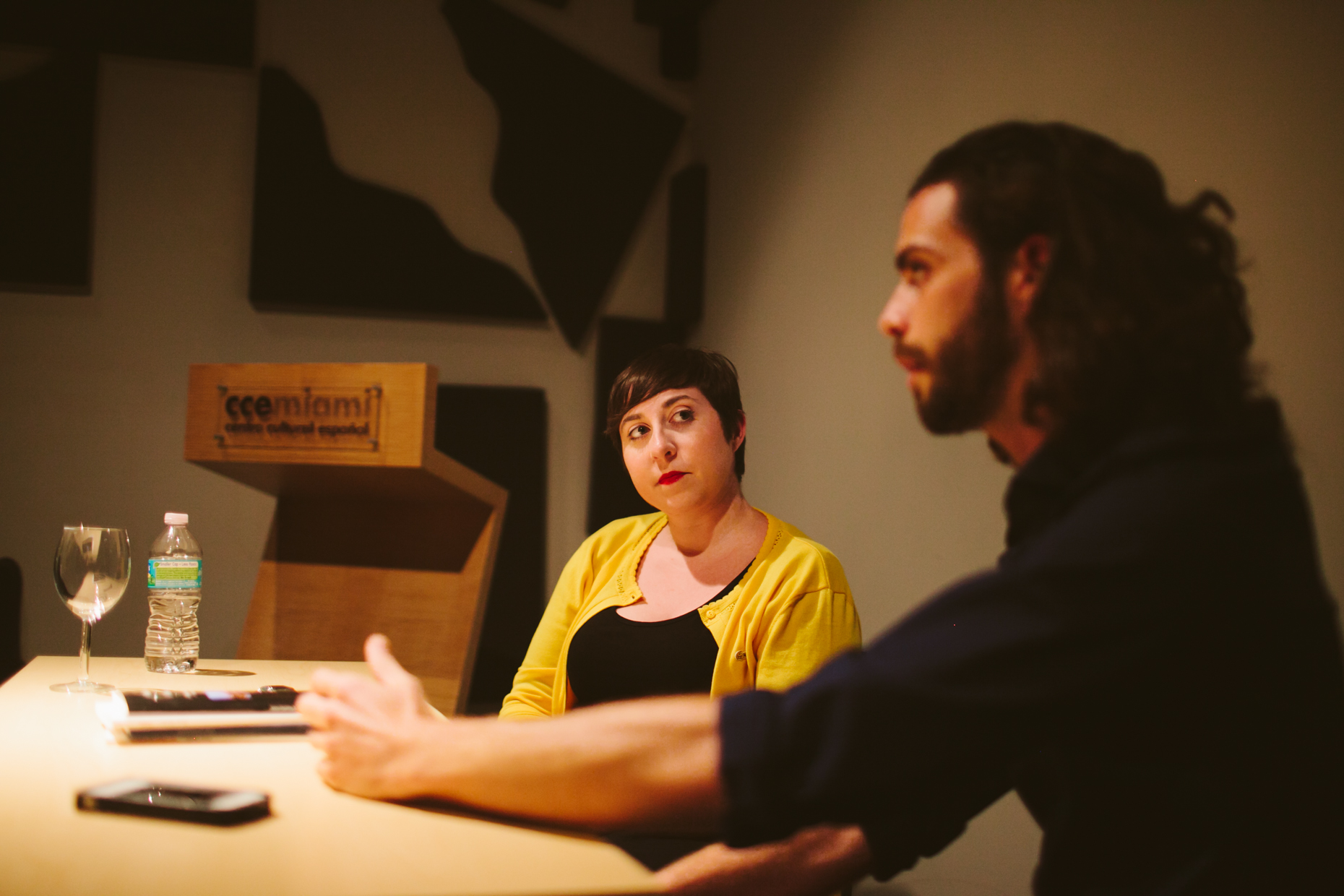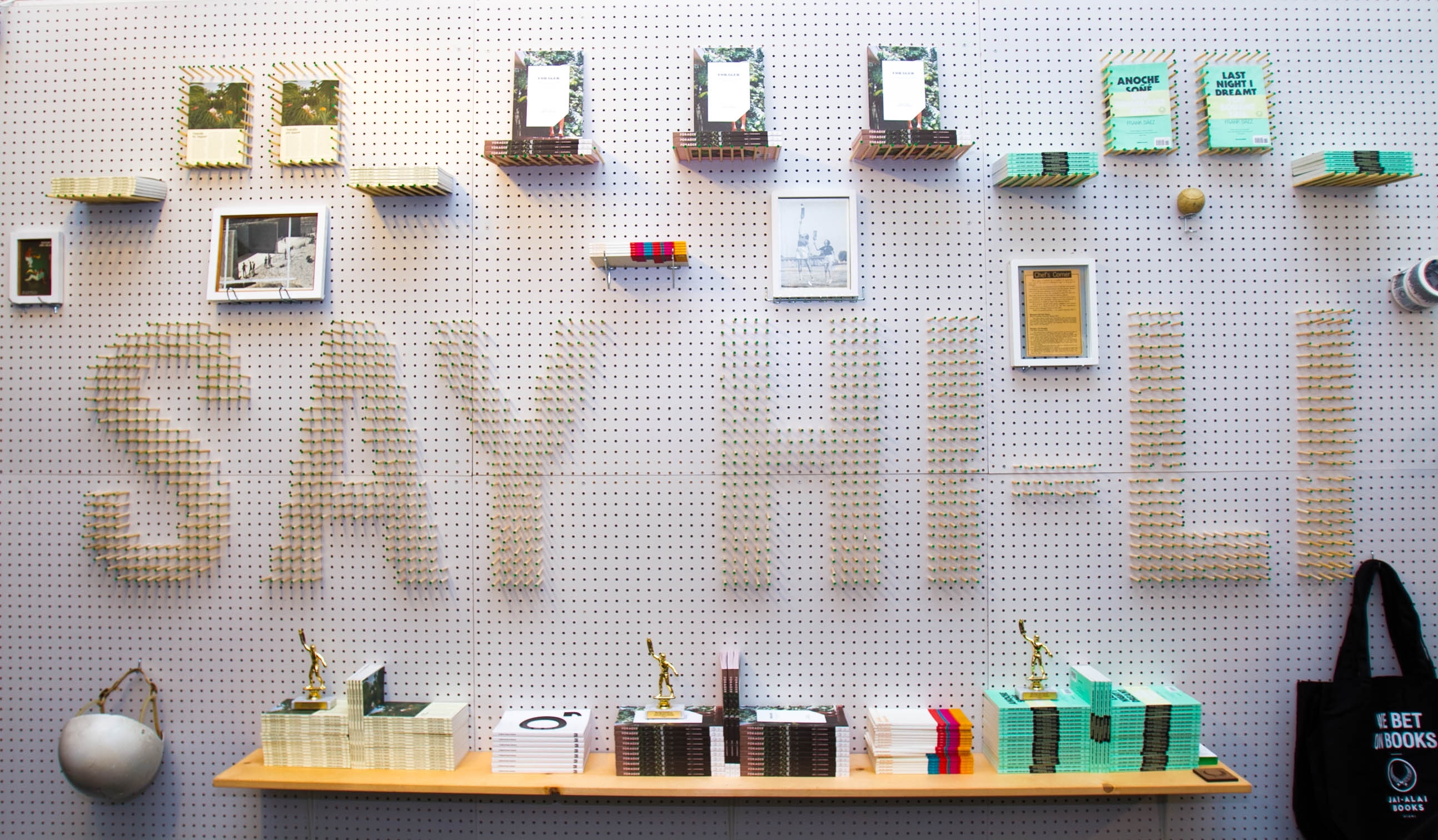
Jai-Alai Books’ P. Scott Cunningham on helping craft Miami’s literary identity
Photo: José Villar-Portela at an event celebrating a “Jai-Alai Magazine” issue release. Photo by Jessica Kassin.
In 2014, Jai-Alai Books won a three-year Knight Arts Challenge grant to create a local publishing house and help shape the Miami’s literary identity. Executive Director P. Scott Cunningham wore a cesta (a basket used in the game of jai alai) on stage that night to receive the award. “It was a fun night,” Cunningham said. “And winning the award was a tremendous validation of our idea.”
With the grant, Jai-Alai Books has steadily expanded its catalog, and the press recently introduced the Toi Derricotte & Cornelius Eady Chapbook Prize, which will fund the publication of a chapbook-length manuscript by a black poet. The poet will also receive a $500 award and a one-week residency at The Writer’s Room at The Betsy Hotel–a program that is also a Knight Arts Challenge winner.
In this interview, Cunningham talks about fashioning Miami’s literary identity while maintaining his own mojo as a writer. He also wants would-be authors to submit book proposals during the 2015 Miami Book Fair International.
It’s almost been a year since Jai-Alai Books won a Knight Arts Challenge grant. How has the process of setting up a small press going? The process is fun because we’re making it up as we go along. I think we had a pretty good idea of what the press’s identity would be when we started, but we’ve still learned a lot about what works as a Jai-Alai project and what doesn’t.

Elena Medel and José Villar-Portela. Photo by Gesi Schilling.
Any big news for this year? The big news is that we’ll begin accepting proposals and submission this November, during the Miami Book Fair. The book fair is the biggest literary event on the calendar in Miami, so we’re also releasing two-and-a-half new titles. One is the first U.S. publication of Spain’s most important poet under 40: Elena Medel. It’s her first book, which is called “My First Bikini,” and she wrote it when she was 17. Some of the poems were written while she was actually in class in high school, and the book is an incredibly erudite look at being an adolescent. The other is “Eight Miami Poets,” a window into some exciting local poets who do not have a full-length book [published] yet. And the half book is a zine of poems written by residents of Miami-Dade County detention centers.
“Eight Miami Poets” focuses on local, unpublished talent. Do you envision Jai-Alai Books as a vehicle for getting Miami writers national visibility? “Eight Miami Poets” is definitely my personal attempt as an editor to let the world know that Miami has a wealth of young literary talent. The book was originally going to be three poets, but I couldn’t limit it to just three. And then I had a hard time limiting it to eight, but the book was already 100 pages, so I had to. It’s not an anthology—just one person’s particular window.
“Jai-Alai Magazine” is the precursor to the press and is now edited by J.V. Portela (or José, as you and I know him). He’s very dedicated to making the magazine as local as possible, and I hope that it has helped out Miami writers. That is certainly one of the principal goals.
There has been lots of negative chatter on social media and in the press about the publishing world, especially the world of poetry. Recently, “Best American Poetry 2015” guest editor Sherman Alexie included a poem by a white man writing under a Chinese pseudonym as a “strategy” for getting his work published. In what ways are Jai-Alai Books and Jai-Alai Magazine pursuing diversity? I don’t view that chatter as negative. The issues that editors have faced in the past year, and the “Best American Poetry” thing was only one of many instances in which an editor’s choices were rightfully called into question, are making the literary world a better place. If you’re going to call yourself a gatekeeper, and every editor and publisher certainly is a gatekeeper, then you have a responsibility to push past your own biases in search of the best work.
Appointing José as editor of the magazine was definitely part of my vision of making it more reflective of Miami. As a fully bilingual writer and speaker, he has been able to bring a way more diverse set of writers into the magazine than I was when I was editor.
With Jai-Alai Books, we’re trying to create our own Miami within the books we publish, and the Miami we see is the one that includes all of the city’s different cultural influences. As just one example, we started a partnership this year with Cave Canem to publish one chapbook a year by a black poet. Miami has an incredible wealth of black history, and we see a lot of great cultural things happening in communities like Overtown, Liberty City and Opa-locka. We felt strongly that a Miami press, especially at a time in which there is an absurd number of talented black writers at the forefront of their genres, should not just publish black writers but make publishing them a part of our identity.

A Jai-Alai Books retail display. Photo by Carolina Mendez.
Do you have events planned during the Miami Book Fair International? If so, what do you have planned? Of course! The Book Fair is our Art Basel. We’ll be selling books during the street fair, so people should come see us, but we’ll also be producing an event on Tuesday night, Nov. 15, at The Swamp called “The World’s Smallest Poetry Reading.” Literary organizers are always trying to inflate their attendance numbers, so we decided to go in the other direction. We’ll have readings all night, but only one person will be allowed in at a time. So when you’re not in the actual reading, all you’ll be able to do is drink, hang out with friends and listen to music. Boring, right?
Yes, sounds boring! I’ll be there. So, you’re the executive director of Jai-Alai Books and O, Miami, and also a writer leading an organization that promotes poetry. What about your own work? How do you find time and energy to write–or do you? I don’t divide my work into “personal” and “O, Miami” anymore. To me, it’s all the same. So yes, I write. (It’s like confessing a sin.) But writing doesn’t drain my organizing energy or vice versa. They feed one another. Both make me happy, and I’d be less happy if I stopped doing either.
What are you working or what would you like to be working on? I have a book of poems that’s done that I’m sending out, and I have a chapbook of translations that I’ll probably send out this fall, if I can find anyone who would publish such a thing. I’ve also been slyly working on a book of essays. Then, as always, I’m writing new poems and translating poems as well. Like every other writer, I would like to be doing much more than I am, and I feel guilty about all of it.
Who is your favorite poet? This is a boring answer, but I’m pretty obsessed right now with Federico García Lorca. Like every other major poet I’ve read with any depth, he’s a much a different poet than the one that had been advertised to me. Surprise, surprise, there’s no replacement for actually reading the work.
When will the next issue of “Jai-Alai Magazine” come out? Next issue of “Jai-Alai” mag comes out in December! Stay tuned.
The book launch party for “My First Bikini” by Elena Medel will take place on Oct. 22 at 7 p.m. Visit the Jai-Alai Books website for details.
Recent Content
-
Artsarticle ·
-
Artsarticle ·
-
Artsarticle ·

